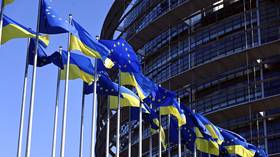Russia changes position on Ukraine’s EU membership bid

Russia has altered its stance on Ukraine’s prospects of EU membership, Moscow's Deputy Permanent Representative to the UN, Dmitry Polyanskiy, has revealed. Such a goal now cannot be a part of any peace deal with Kiev, the diplomat told Unherd News in an interview on Thursday.
Previously, Moscow was not concerned about the prospects of Ukraine eventually joining the organisation, he indicated, but the position has since shifted.
Polyanskiy explained that the catalyst was Brussels' behavior since Russia launched its offensive, in February. Moscow feels that the EU has become completely aligned with the US-led NATO.
He particularly pointed to a recent statement from the bloc's chief diplomat Josep Borrell, in which the Spanish-born official openly expressed a preference for a military solution to the present conflict.
“We were at this point not very worrying about the European Union, but the situation has changed after Mr. Borrell’s statement that ‘this war should be won on the battleground’ and after the fact that the European Union is the leader in deliveries of arms [to Ukraine]. I think that our position on the European Union now is more similar to NATO because we don’t see a big difference,” Polyanskiy stated.
The conflict has already escalated to the point that there’s little to no place for diplomacy left, he admitted. Polyanskiy blamed, what he described as, the lack of constructive dialogue, the inability of Kiev to keep its promises, and Western efforts to prolong the hostilities for the situation.
“At this point, frankly, I see no diplomatic possibilities given the position of Ukraine, given the fuelling of this conflict by the West. Being a diplomat, I have to acknowledge that there’s no way for diplomacy right now,” he insisted.
Polyanskiy refused to provide any estimates on for how long the conflict could go on. “I don’t have a crystal ball to predict such things,” he said.
If the conflict in Ukraine is tried to be stopped by putting gas into fire by the Western countries, of course it can be protracted for some time, but it would not change the whole pace of the conflict, it would not prevent Russia to reach the objectives.
Russia attacked the neighboring state in late February, following Ukraine’s failure to implement the terms of the Minsk agreements, first signed in 2014, and Moscow’s eventual recognition of the Donbass republics of Donetsk and Lugansk. The German- and French-brokered protocols were designed to give the breakaway regions special status within the Ukrainian state.
The Kremlin has since demanded that Ukraine officially declare itself a neutral country that will never join the US-led NATO military bloc. Kiev insists the Russian offensive was completely unprovoked and has denied claims it was planning to retake the two republics by force.












